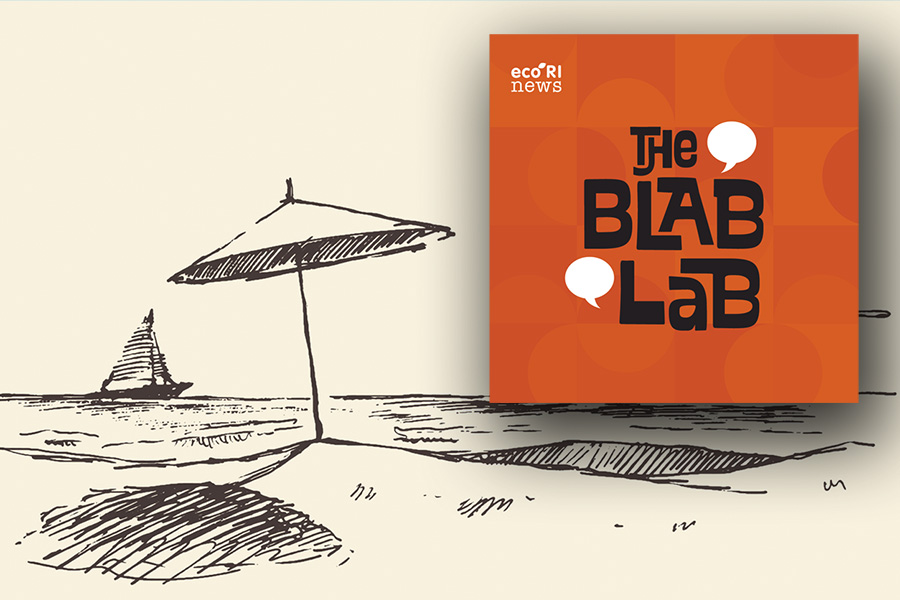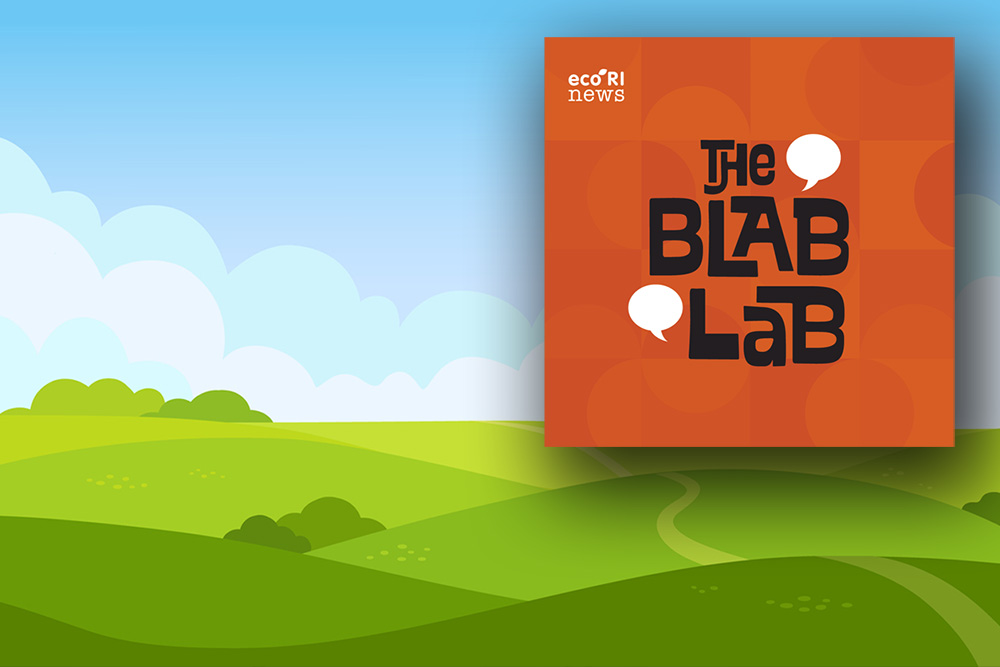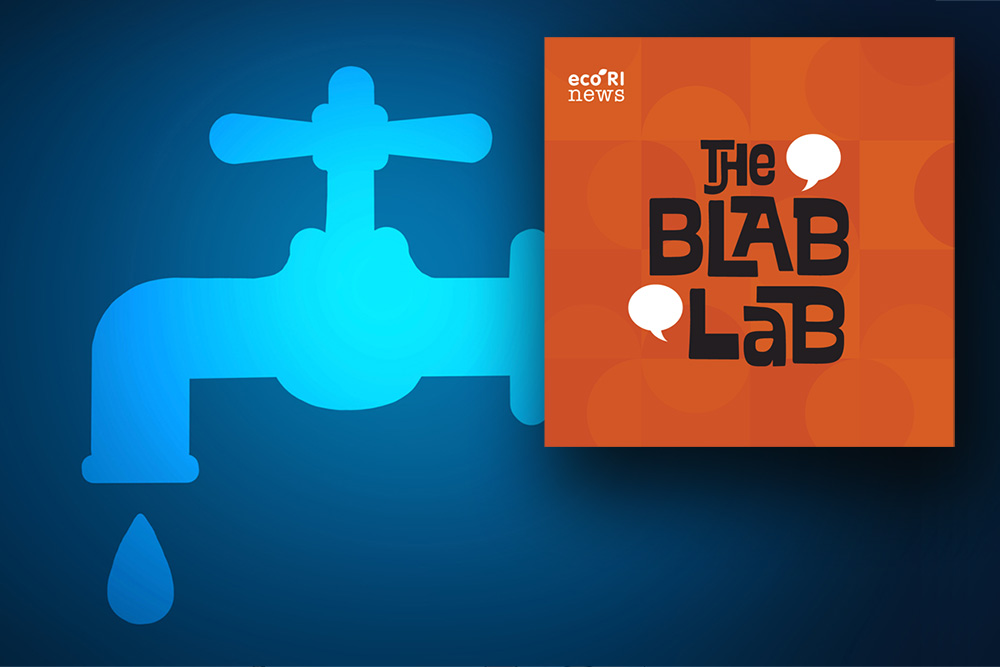Activism or Greenwashing: Earth Day Then and Now
April 20, 2023
ecoRI News reporter Colleen Cronin and publisher Joanna Detz talk about the original Earth Day, bring in voices of some of that day’s attendees, and discuss what the day means now that the climate crisis and its impacts are being felt acutely. Has Earth Day lost its punch? Or does it still serve to spur environmental activism?
Subscribe and listen on iTunes, Spotify, Stitcher, or wherever you get your podcast
This transcript was edited for clarity and length.
Colleen Cronin
Welcome to The Blab Lab, a twice-monthly podcast from the reporters of ecoRI News, where we unpack the critical environmental issues facing the southern New England. I’m reporter Colleen Cronin, and today we’re doing something a little different. Our publisher Joanna Detz, is going to be asking me questions about some reporting I’ve been doing about Earth Day. When we talked about doing the episode last month, we talked about how commercialized the holiday has become since it was started in the 1970s. So, I wanted to reach out to folks who’d organized the first Earth Day to ask them about how it has changed over time. So Joanna, did you read my story?
Joanna Detz
I did. It was my first time reading you raw.
Colleen Cronin
It hadn’t gone through spellcheck yet.
Joanna Detz
It’s okay. We’re all, human. I spelled Warwick wrong the other week.
Colleen Cronin
I have to always check Burrillville. Two Rs. I don’t know how many Ls. And like, wishing we all had accents that rolled the Rs, because then would be a really fun word to say.
Anyway, um, so yeah, What did you think of my story?
Joanna Detz
I thought it was a fascinating way to approach a story about Earth Day, by talking to some of the original Earth Day celebration attendees, some of the old timers.
So tell me a little bit about this Will Collette you talked to. You lead the story with some of his anecdotes, and he sounds like a colorful guy. What did he have to say?
Colleen Cronin
He was super interesting. So how I found Will Colette was … I was just thinking about how some of the original organizers might feel about some of the greenwashing that has happened to Earth Day. So I thought to myself, OK … OG organizers … How do I find those people? So I Googled first Earth Day. And Will’s blog came up with a very fiery blog post about how he felt about what the day has turned into. And so I got his number, and I called him up.
Will Collette
Well, back in 1970, things were crazy. I was in between going to junior college and about ready to start college. I had been very active in the anti-war movement. And frankly, I was looking for something that was a little bit more gentle, and also a bit less dangerous. I mean, I had a friend who was being looked for by the Providence police for setting off a bomb that blew up the statue of General Burnside at Burnside Park. It was crazy time.
Colleen Cronin
And he said a lot of people who were coming up around the same time as he was, you know, progressive people, wanted to be involved, but maybe wanted to do something that was a little bit gentler. So he got involved in some of the early Earth Day organizing; he was involved with Ecology Action, and he was actually on the propaganda committee. And the way he describes the first Earth Day is …
Will Collette
It was that kind of a mix of a lot of people turning out, pretty stoned, you know, having a good time celebrating good fellowship, and, you know, applauding everybody who stood up and said something … no matter how stupid or useless.
Colleen Cronin
A couple months after this happened, the group that Will was in had a disagreement about the policies they wanted to focus on. Part of the group wanted to focus on big polluters of Narragansett Bay who were just dumping stuff into the water, and the other half of the group wanted to try to require that pleasure boats have holding tanks, which is also important, but one is bigger than the other. And so in Will’s opinion, he really felt like they should be going after the big fish.
Will Collette
I gave a short speech, basically saying I’d like to clarify the choice we’re looking at. One is to go after corporate criminals who are shortening everybody’s life, as opposed to putting all our efforts into keeping people from pissing in the bay. And we lost.
Colleen Cronin
And he used some colorful language to describe but he you know, he just said …
Will Collette
I don’t need this. This is not going anywhere.
Colleen Cronin
So he did a couple other things after that, and he ended up getting involved with Lois Gibbs, who was at the Center for Health and Environmental Justice. She was famous for organizing around Love Canal, an area near Niagara Falls, where there was tons and tons of toxic waste dumped. So she was heavily involved in organizing in in that specific area.
But then, she started this organization which then helped people around the country who had gone through similar things. So Will had a lot of really sad stories about the things that he saw at a former factory site in Puerto Rico, where they made thermometers and the children had gotten mercury poisoning — and just the horrible, horrible way that disfigured the children.
For someone who saw all that, it just confirmed that he wanted to go after these big things, because he saw a lot of tough stuff.
But a funny story about some of his battles … He was fighting a waste-management dump site or proposed dump site near a river down South. And he started getting kind of into a little bit of a fight with some people who showed up at a meeting.
Will Collette
There were a bunch of guys all along the back wall of the auditorium, with their arms crossed, and, you know, tattoos. They started heckling, and I started yelling back, saying, “Is this guy paying you enough? Is Mr. Waste Management paying you enough to put your families in danger?” And they yelled back, “Shut up; you’re a dead man walking.” The woman in leadership and local group told me those guys were members of the local Klan.
Colleen Cronin
I think another interesting point is, Will was getting into this business because it was supposed to be gentler than the anti-war movement. But I mean, I would argue that almost any activism at that time was a bit more militant, more extreme, more radical. And the people I talked to were saying, well, it was a crazy time which required some crazy things to happen.
So Will doesn’t really love Earth Day.
Joanna Detz
So the first Earth Day was in 1970. Right? Would it be fair to say that the environmental movement grew out of that?
Colleen Cronin
I mean, I think for at least the people that I spoke to, yes … It grew out of a feeling that something had to be done about a lot of different things. And that was what Earth Day was. The event was a product of the time. And then in the 1990s, there was a bit of a resurgence of Earth Day here and in a lot of other places, because you’re getting the 20th and the 25th anniversaries of Earth Day.
Joanna Detz
Can you talk a little bit about the ‘90s? As a child of the ‘90s. I was a bit dismayed to read about what happened at Goddard Park.
Colleen Cronin
Some people in the state decided to form an Earth Day committee to celebrate these anniversaries. And I talked to Terri Bisson, who was who worked at Rhode Island Department of Environmental Management for 37 years, 16 of which she spent doing a lot of this Earth Day organizing.
Terri Bisson
We were basically pulling together small, environmental fairs, where we would invite environmental organizations to come in to talk about their activities and teach people about different aspects of environmental protection. But then we had this epiphany where we felt like we were preaching to the choir, because a lot of the events were attended by people who were already active in environmental issues. The Earth Day committee decided we needed to bump things up and broaden the public engagement and public outreach.
Colleen Cronin
And one of those bigger things was doing concerts. So that brings in Jim Corwin; he was the general manager of a rock radio station. And so he brought in a lot of talent, like the Marshall Tucker Band. And they held these concerts to try to bring in people who maybe wouldn’t usually engage with the environment.
Jim Corwin
There were so many people coming out, we shut the exit down on the highway and caused problems on I-95. We had 10,000 people come to Goddard State Park. I may be exaggerating there, but there were way too many. The concert went off, you know, and people had a great time. And at the end of it, the park was trashed.
Colleen Cronin
And so they decided, although they got a lot of awareness out about Earth Day, they should try doing some other things. So then they shifted to doing those events inside. And, back in the 90s, when this was happening, recycling and composting, and the individual things you could do to help the environment weren’t as mainstream as they are now. So bringing people to the table was a huge part of of Earth Day for these organizers.
Joanna Detz
I wonder, though, I mean, looking at the trajectory Earth Day, and thinking about some of the frustrations that somebody like Will Collette has with Earth Day, If that’s just how movements work. They start out as a radical idea. And then in an effort to bring in more people, they get a little more generic; they kind of lose touch of the original mission. And yes, they do bring in more people, but then there’s opportunity for corporate greenwashing. I’m wondering what you think about that?
Colleen Cronin
Yeah, that’s interesting. I think when Earth Day was starting out, to a great degree, it wasn’t as much about the feel good part of Earth Day, it was truly, you know, things are on fire; rivers are on fire. The way we’re starting to see climate change impact our everyday lives today, that was very much how these environmental hazards were impacting people’s lives back then, and still do in in certain neighborhoods. And so it was just glaringly obvious that things needed to get done.
And I think that, as you bring more people in, then some of it is about, well, how do you make people feel good about this? And I think that Will was talking about how in Charlestown, R.I., they’ll do Earth Day cleanups, and I don’t think he has anything against cleanups, I think he might have a problem making litter such a big issue when he feels like there’s more important issues out there. Sometimes they’ll do these cleanups in pretty wealthy neighborhoods in Charlestown. And, you know, that’s not the purpose of Earth Day to him.
Will Collette
It generally amounts to going down by the shoreline and cleaning up the roads and the properties of absentee landowners. You want people to volunteer to go and clean up rich people’s backyards. Really, is that what you want?
Joanna Detz
So, as a resident young person, the only staff member under 30 … Can I say your age? Yes, you’re 24. What do you think about Earth Day?
Colleen Cronin
You know, when I first like heard of Earth Day, I was probably six or seven. I was in elementary school. And I remember for Earth Day, we gardened outside. I thought it was a day about being outside. I didn’t understand what climate change was. And now, partly because I work for an environmental news organization, I think about the environment so much every day. I have been thinking so much about how we have to do something; this is an emergency. Earth Day in some ways, is not something I think about because, I think about the environment all the time.
Joanna Detz
It’s kind of the old cliché: Every day should be Earth Day.
Colleen Cronin
What is your relationship to Earth Day?
Joanna Detz
I can sympathize with a lot of what Will told you. I do think it’s become a Hallmark holiday, if you will. And while it’s nice to see groups going out and picking up litter, and that does build awareness. Part of me thinks: Why are we still picking up litter for Earth Day? You know, is it working? Is Earth Day working? Maybe it’s not working; maybe we need to do a little bit more. And, to Will’s point going after bigger corporations … that’s also part of it — holding them to account and exposing polluters. I guess that’s kind of what we’re doing here at ecoRI News.
Colleen Cronin
Thank you for listening to The Blab Lab, ecoRI News; environmental podcast. We want to thank Roger Williams University and professor Bernardo Motta for letting us use the podcast studio here. We also want to thank Vanessa Carlton whose song “Willow” you hear in the beginning and end of this podcast.
If you have any questions, or if this episode sparked any ideas for future stories or future episodes, please feel free to email me at [email protected].
Categories
Join the Discussion
View CommentsYour support keeps our reporters on the environmental beat.
Reader support is at the core of our nonprofit news model. Together, we can keep the environment in the headlines.
We use cookies to improve your experience and deliver personalized content. View Cookie Settings



